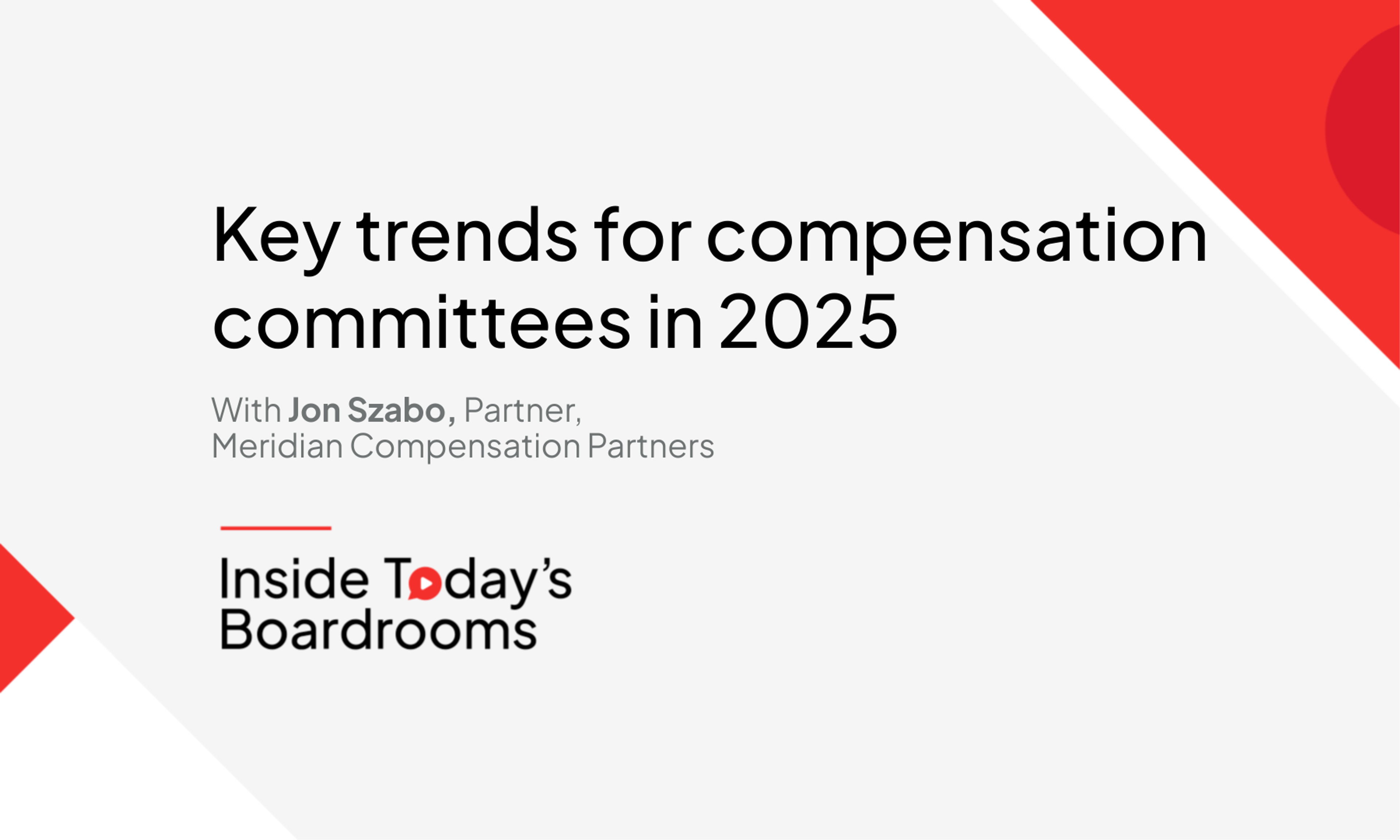Top corporate governance trends for 2025 & beyond

Corporate governance was born in the 1970s as lawmakers and the Securities & Exchange Commission pushed to prevent economic unrest by holding companies and their directors accountable. While many corporate governance trends have come and gone since then, what remains is a desire among regulators and shareholders alike to see corporate boards operate transparently and ethically.
Yet, the governance landscape is changing swiftly. Our global regulatory roundup shows that generative AI is driving far-reaching digital transformation at a time when cybersecurity threats are on the rise. Geopolitical risks and financial fraud and abuse have further challenged boards to shore up data and infrastructure while remaining competitive. Despite the rapid pace of change, not all boards have kept up. A recent Deloitte survey shows that generative AI is not yet on the agenda for 45% of boards — a potentially significant blindspot.

At the Elevate Leadership Summit in September 2024, Ana Dutra, Global Veteran Board Director, two-time CEO and Fortune 250 Senior Executive, told Diligent Institute, “The winners will be the companies that recognize that risk and opportunities need to be standing discussion topics on the board agenda. Think about changing your committee structure to reflect this — and make sure that you aren’t throwing everything under the Audit Committee’s purview. Beware of the dangers of a purely check-the-box mindset when it comes to preparing for these risks and identifying emerging opportunities.”
What do boards need to know about how corporate governance will evolve in 2025 and beyond? Here, we will unpack:
- The emerging trends shaping the future of corporate governance
- Corporate governance trends at work today
- Key governance trends influencing global markets
- Technology to help create a governance framework that will keep up
Emerging trends in corporate governance for 2025
The world has changed significantly in the past year, and the business landscape is poised to evolve further. As such, these trends in corporate governance for 2025 aren’t just about boardroom conversations. They are about how internal and external forces will fundamentally reshape corporate operations — and what boards need to know to stay ahead.
Trend 1: Generative AI will be a significant opportunity for organizations that can balance regulations and readiness
Technology is already omnipresent in many boardrooms. For years, tools like board portals have streamlined collaboration and fostered security and transparency. In 2025, Generative AI is posed to transform the boardroom and broader corporate operations. However, boards must balance developing readiness and anticipating regulations on the road to adoption.
69% of organizations are delaying AI investment decisions due to an expected regulatory increase. Many parts of the world lack broad AI regulations, but Europe’s impending EU AI Act sheds light on many regulators’ priorities: ethics and transparency.

At the same time, readiness is emerging as one of the most significant indicators of AI success. Organizations need AI policies that advance the right talent and structure to cultivate this new technology.
“Unless we genuinely overcome the hype and focus on building humane trust and organizational readiness, AI is unlikely to gain meaningful adoption in the enterprise. Without meaningful adoption, achieving real value with AI could remain a distant promise,” says Florin Rotar, Chief AI Officer at Avanade
These policies will likely revolve around leveraging AI to increase efficiency and productivity while decreasing costs.
Drive adoption with Diligent AI
Ensure your boardroom is ready for AI with Diligent AI's advanced tools. Boost productivity, anticipate risks, and stay compliant.
Discover moreTrend 2: Corporate culture will reckon with financial fraud and abuse
Financial fraud can plague even the most outwardly successful organizations. In 2025, the challenge will be building a corporate culture that roots out bad actors. This is easier said than done, given that corporate culture isn’t always effective at promoting transparency.
“There’s often an inclination to avoid bad news, with a hope that problems will be resolved before they escalate to the board level," says Pav Gill, CEO of Confide.

Boards should embrace this trend in corporate governance by taking a closer look at legal and regulatory compliance practices. A deep understanding of the organization’s compliance and cultural challenges enhances oversight and humanizes the organization. Collaborating with senior leaders is a key way to cultivate this familiarity.
“There should be a direct, consistent line of communication from the Chief Compliance Officer (CCO) or General Counsel (GC) to the board,” says Gill.
While boards traditionally held senior leaders at arm’s length, integrating leadership with board directors can advance the processes, talents, and best practices compliance depends on. This ethical culture also has tangible benefits for the bottom line. LRN’s research shows that organizations with strong ethics outperform others by up to 40% across key metrics.
Trend 3: Ethics will be a key focus
New technology may introduce new ethical issues. AI, for example, isn’t readily transparent and has biases, which can complicate data-gathering and decision-making for boards striving to offer their shareholders greater visibility.
At a time when shareholders are already concerned with boardroom practices, new technology will only intensify the ethical issues boards face. Quickly evolving global regulations and AI technologies have challenged companies to ramp up.
Ethics aren’t just about regulations either. AI brings numerous well-documented risks, including unintended bias and invasions of privacy. Harvard Business Review details several questions corporate AI strategies must answer looking ahead to 2025, including:
- How might the AI we design, procure, and deploy present ethical risks that cannot be avoided?
- How do we systematically and comprehensively identify and mitigate them?
- If we ignore them, how much time and labor would it take us to respond to a regulatory investigation?
- How large a fine might we pay if found guilty, let alone negligent, of violating regulations or laws?
- How much would we need to spend to rebuild consumer and public trust if money could solve the problem?
Trend 4: Cybercrime is on the rise, emphasizing the need for strong controls
Cybercrime is the biggest risk most organizations will face in 2025. The ever-increasing value of data largely fuels this threat.
“Digital assets drive valuation, and the most valuable businesses are data-centric. This means the bread and butter of your business would then be impacted in a cyber incident,” says Anastassia Lauterbach, CEO and founder of AI Edutainment.
Generative AI has also increased organizations’ attack surface by an estimated 67%. The cost of breaches is projected to rise from $9.22 trillion in 2024 to $13.82 trillion by 2028. Unprepared organizations could face potentially irreparable damage at the hands of cybercriminals.
Over the next year, boards must remain vigilant. Infrastructure and data upgrades of all sizes must be considered high-risk. Implement software and configuration changes carefully and strategically to avoid widespread disruption or damaging breaches.
Take CrowdStrike, for example. This U.S. cybersecurity company deployed a faulty CrowdStrike Falcon software update in July 2024 that triggered an outage affecting roughly 8.5 million computers using Microsoft systems worldwide. The insurance costs are still mounting but are expected to reach $300 million to $1 billion — costs that could have been twice as high were the outage malicious. More robust change management and a strategic approach could have mitigated this far-reaching crisis.
Trend 5: Better data infrastructure will unlock shorter board meetings and more agile boards
Boards have incredible responsibilities, all of which require complete oversight of business activities. Yet, in many cases, outdated reporting structures make it difficult for boards to access the information they need to make key decisions.
Many boards are now embracing a shared trend in corporate governance: better dashboards. Centralizing risk data to monitor and mitigate risk frequently has the potential to shape more proactive boards.
“The quarterly board meeting will probably be a lot shorter because the board will have met several times in between,” says Schindlinger. “We will have had quick little touch bases because we saw something on the dashboard. Things are moving way too quickly for boards to wait for a perfectly crafted board deck.”
As technology evolves, ESG pressures rise, and cybersecurity threatens performance, boards will look for ways to streamline and centralize reporting. Boards that don’t have an effective way to collect and review key information may lose their competitive edge — or even fail to comply with disclosure rules from the SEC and the EU.
“Boards are going to have to be a bit more fluid and flexible. Dashboards are really the only way forward,” — Dottie Schindlinger, Executive Director of the Diligent Institute
Make dashboards your competitive edge
Gain unmatched clarity on risks, streamline meetings, and ensure compliance. Transform decision-making with real-time data and analytics.
Discover moreTrend 6: Corporations need to nurture and attract young talent
The workplace will transform over the coming years. 58% of the global workforce will be Millennials or younger by 2030, many of whom were hired during the pandemic and have primarily worked remotely. Job hopping — switching jobs frequently — has also emerged as a break from traditional corporate culture.
“They’ve never been in an office. They don’t know what corporate culture looked like pre-pandemic because they’re not a part of that history,” says Schindlinger.
As a result, talent, risk and culture have dominated the board agenda. Businesses are grappling with significant demographic shifts as baby boomers near retirement and new generations take their place. Additionally, board and C-suite succession may become challenging as experienced board directors near retirement without qualified younger talent to replace them.
Companies should start nurturing young talent by considering which tools and structures can facilitate innovation and mentoring; many organizations are renaming committees to highlight “talent” and “culture.” This includes thinking about job hopping differently.
“Rather than saying they only stay for two years, you say, hey, this person stayed for two full years,” says Schindlinger.

Boards must also think beyond tradition and consider whether hybrid work models that appeal to young talent can bolster the productivity their organizations need.
“Boards should be asking: What do we need to do differently? What are the tools we have in place to keep everyone connected? How do we keep the board connected?” says Schlinger.
Looking ahead, tools like Diligent Messenger can keep the board connected and engaged in strategic conversations about talent. Using these tools advances conversations about nurturing young talent rather than waiting for board meetings.
Trend 7: All eyes are on board evaluations
Investors and consumers continue to focus on board effectiveness. They want to see board directors and company executives fulfill their fiduciary duties and act with integrity. That means boosting financial performance and considering the broader impact of corporate activities.
However, boards haven’t always emphasized evaluations in this same way. 44% of directors say board assessments are ineffective because members aren’t sufficiently invested in the process. At the same time, 49% of directors want to replace at least one director on their board, signaling an underlying discontent with board performance.

To take this corporate governance trend seriously, boards must commit to thorough, confidential evaluations that foster honest dialogue and translate insights into tangible actions. This requires full participation from every member and a commitment to implement changes based on the evaluation findings. For more inspiration on conducting effective board evaluations, view our board evaluations template.
Current trends in corporate governance
Trend 1: Politics are influencing the boardroom
Many people view The United Nations’ 2004 Who Cares Wins report as the document that made environmental, social and governance (ESG) mainstream. So, while ESG isn’t a new corporate governance trend, how it’s politicizing the boardroom is.
Politicians on both sides of the aisle have different opinions on ESG and, as a result, different ideas about what constitutes good governance. The recent election in the U.S. only underscores the worldwide shift to the right, opening the door to changes in ESG policy and governance more broadly.
“A political party comes in and sweeps away what was existing, a trend seen over the past decade, especially in the U.S. This makes the job of corporate boards increasingly difficult," says Schindlinger.
In 2025, modern boards will likely have to chart their paths forward individually, toeing the line between complying with the SEC, other regulatory bodies and the rapidly evolving Trump administration while meeting the expectations of their unique shareholders and customers.
Political winds in the U.S. are shifting which might upend existing focus on sustainability in the States. However, most other major economies in the world are increasing focus on climate change.
Trend 2: Boards are facing increased scrutiny from all sides
In the post-universal proxy era, shareholders continue to hold boards accountable — often in surprising ways. Governance proposals increased for the first in recent years during the 2024 proxy season, as did compensation proposals.
Support for say-on-pay proposals also remained high, underscoring shareholders’ desire to have their voices heard. The universal proxy process has also opened doors for unions following recent high-profile strikes, with many unions submitting more proposals in 2024 than they did in years prior.
Proxy season also echoed the political unrest many organizations have faced in the past year. Anti-ESG proposals soared, even though support for them has not. Companies submitted submitting no-action requests in connection with 43% of proposals from anti-ESG proponents, compared to 25% for others.
Boards can prepare for these shareholder-centric trends in corporate governance by continuing to align closely with their shareholders’ expectations. Consider why shareholders invest in your company and their goals beyond profitability, then offer transparency around board decision-making in those areas. A company-specific strategy for engaging with shareholders around key issues can avoid unrest.
Trend 3: Economic uncertainty changing company strategies
At the end of 2022, economists and corporations feared the following year would bring a recession. Rising interest rates and inflation only added to the pressure for boards to perform despite growing uncertainty.
Many companies prepared throughout 2023 by laying off employees, attempting to retain valuable workers and offsetting the fluctuating workloads with contractors. By 2024, the Fed announced that a recession might not occur and has even implemented several rate cuts. With the impending swearing-in of the Trump Administration in January 2025, boards are bracing themselves for swift policy shifts, regulatory changes and broad tariffs that could have a far-reaching impact on corporations.
Many boards have adopted more comprehensive enterprise risk management strategies to cope, but it’s also important to be proactive rather than reactive. Consider how your decisions will foster — or inhibit — long-term growth no matter the political climate, and strive to act in the best interest of your company’s future.
Trend 4: Stakeholders want greater CEO oversight
Consumer skepticism about CEO compensation isn’t new. Many consumers and even many shareholders believe CEOs are overcompensated. More transparent compensation packages can counter this scrutiny, but CEOs will likely remain in the spotlight.
Over the past year, boards and executives have taken that attention seriously. In PwC’s Annual Corporate Directors Survey, 71% said their boards took action related to shareholder activism in 2024. This action has largely been driven by boards’ desire to engage with shareholders proactively. In fact, 26% of directors say they also revised compensation structures to keep with shareholder expectations.
In 2025, shareholders will want to see CEOs performing, specifically making what shareholders see as the “right” decision to maximize returns. At the same time, rising inflation and supply chain issues have renewed the call for corporations and their CEOs to act ethically and responsibly.
Global trends in corporate governance
Trend 1: AI regulations worldwide are evolving — and fracturing — quickly
As AI solutions proliferate, so do the regulations attempting to govern its use. In 2024, different regions have taken distinct approaches to AI regulation, presenting a particular challenge for boards overseeing global enterprises.
The U.S., for example, has favored a decentralized regulatory framework, with state-led initiatives like the Colorado AI Act passing ahead of any federal action. Across the border, Canada has been working to enhance its 2017 AI strategy with specific guardrails, notably the Artificial Data and Intelligence Act, to address unlawful data use and AI deployment.
The EU, meanwhile, has taken much more unified action. The far-reaching AI Act institutes four levels of AI risk and strict compliance protocols for all member states. Regulators in the UK have focused on sector-specific regulations grounded in overarching principles of safety and transparency.
These varied regulatory approaches are challenging enough for boards, and that’s to say nothing about frameworks in the Middle East, Asia-Pacific and Latin American markets. China has an expectedly centralized approach to regulating generative AI; Japan has, on the other hand, led with a human-centered approach to AI as Singapore seeks to update existing AI laws.
Latin America hasn’t adopted regulations yet but is exploring oversight that emphasizes innovation and transparency; Brazil, in particular, has proposed regulations to protect fundamental human rights in the face of AI. Led by Saudi Arabia and the UAE, the Middle East is integrating AI into national strategies focusing on ethics and economic growth.
These varying frameworks for AI will push boards to develop nuanced and region-specific approaches to this new technology. Boards should consider cultivating expertise in AI and other emerging technologies and leveraging robust entity management tools that can adapt to different legal and regulatory requirements.
Embrace the future of AI regulations
Stay ahead of AI regulations with our 2025 risk and opportunity outlook. Gain insights to navigate the evolving landscape effectively.
Discover moreTrend 2: All eyes will be on the Russia-Ukraine war and the rise of the right in Europe
Geopolitics in Europe is at an inflection point. Many countries are rallying around Ukraine, while the surge in far-right election victories has yielded some support for Russia. Boards in the EU are already grappling with significant supply shocks and resulting price increases. This has strained European economies, exacerbated energy security and tested the unity of the EU.
The rise of anti-immigration and far-right policies has further strained EU alliances. Liberal democratic norms are under threat in countries where they once thrived, and polarization is the new normal.
This corporate governance trend will likely shape board activities in 2025. Boards must navigate a shifting political and economic landscape while building a culture that unites employees across ideological divides.
Trend 3: Health crises are challenging Africa’s economic growth
Recurring outbreaks of infectious diseases and limited access to robust health systems continually strain Africa’s economy. While organizations in the country look to grow, they must also grapple with widespread social inequality and economic instability. At the same time, the youth population is growing in many countries, bringing the potential to drive innovation — and pressure on the government to provide better opportunities.
Together, these factors can either be a tremendous force for growth or foment unrest and instability. Boards operating in Africa will need robust governance practices and a culture that empowers young talent to solidify a competitive advantage.
Trend 4: Emigration and instability are shaping Latin America’s business landscape
Immigration is a significant concern in countries like the U.S., but it also takes a toll on the countries immigrants leave behind. More and more people are fleeing Latin American countries to escape economic hardship, limited opportunities and growing violence. Climate change may also take a toll on these already hot regions, particularly in rural areas that rely on agriculture.
Corporations in these countries will have to navigate potential talent shortages and strained relations with other countries. Boards should be prepared to cultivate the young talent they do have and take action to promote economic development, good governance and stability.
Trend 5: China’s posture influencing operations in the Indo-Pacific
China’s assertive actions and policies have shaped the Indo-Pacific region’s power dynamics. The country’s military expansion and activities in the South China Sea will likely increase tension as neighboring countries worry about maritime security. Despite its strength in the region, China’s relationship with the U.S. and India is increasingly strained, injecting volatility into the Indo-Pacific.
Boards in the region should prepare for potential trade disputes, increased tariffs for goods exported to the U.S., and attempts by China to exert dominance.
Trend 6: The Israel-Palestine war is pressuring boards ideologically and economically
Tragedy runs deep on both sides of the crisis in Israel and Palestine. Boards may have to navigate ideological divides, either between directors in the same room or between the company’s and its customers’ interests. At the same time, governments worldwide are split over which country to support, with the International Criminal Court releasing arrest warrants for both Hamas and Israeli leaders recently.
This may bring challenging conversations to proxy season 2025, but it’s also an opportunity for boards to listen and compassionately respond to those their company serves.
At the same time, the war could continue to exacerbate economic hardships like inflation and oil prices, impacting countries in the region and worldwide. This, too, could trickle down to the strategic direction of many corporations.
Navigate the future
Dive deeper into the future of geopolitical risks and corporate governance with insights from top experts in our 2025 risk and opportunity outlook.
Discover moreTrend 7: India’s commitment to sustainability and accountability is growing
India’s regulatory framework is ever-evolving, especially as changes to the country’s Business Responsibility and Sustainability Reporting (BRSR) framework are on the horizon. In the 2025-2026 fiscal year, the top 250 listed companies will need third-party verification for BRSR disclosures on a compy-or-explain basis; companies that don’t comply must defend why.
This move aligns with the country’s recent emphasis on the credibility and accuracy of sustainability reporting for companies that do business in India. Boards will need to adopt a compliance process involving independent auditors and elevating the ESG profile in Indian-based corporations. The updated BRSR framework also positions India as a global leader in corporate responsibility, so corporations should be similarly ready to be at the forefront of sustainability.
Trend 8: Corporations worldwide are bracing for new tariffs
2024 is not just an election year. For many countries, this is the election year that will shape the political, economic and business landscape for years — and even decades — to come. In at least 64 countries, more voters will head to the polls than at any other time in history, representing roughly 49% of the world’s population.
The election of many far-right leaders could pave the way for fresh tariffs, a threat to growth boards will have to reckon with. European Central Bank Vice President Luis de Guindos has already warned that tariffs — such as those proposed by U.S. President-elect Donald Trump — could harm global growth and lead to retaliation and a vicious circle of trade wars.
Though Trump has yet to take office, many corporations are jumping into action. For example, prominent Apple supplier Foxconn moved much of its production out of China and into India to avoid potential tariffs. Some companies are front-loading U.S. imports, others are moving operations into the U.S. altogether, and still others are planning for supply chain delays as operations are inevitably rerouted to new countries.
Historical corporate governance trends
| Year | Trend 1 | Trend 2 | Trend 3 |
|---|---|---|---|
| 2024 | AI regulations worldwide shape the adoption of this technology | The global rise of the far-right shifts political and economic priorities away from ESG and toward traditional metrics | Ongoing conflicts between Russia-Ukraine and Israel-Palestine divide countries and stress the supply chain |
| 2023 | The universal proxy challenges boards to align with shareholders | AI begins to transform the business landscape | Rolling layoffs and hiring freezes impact availability of talent |
| 2022 | Increased standards for sustainability reporting | Rising gender diversity on corporate boards | Greater emphasis on board effectiveness |
| 2021 | Focus on environmental and social issues | Importance of corporate social impact | Board oversight of company culture |
| 2020 | Expansion of remote working | Ethnic and racial diversity on boards | Scrutiny around executive compensation |
| 2019 | Push for greater board quality and performance | Using governance as a tool to add value for investors | ESG took center stage for boards and investors |
| 2018 | Expectation for investors to influence corporate strategy | Increasing engagement with activist investors | Continued focus on board composition |
| 2017 | Push for more uniform governance practices | Holding boards accountable to long-term performance | Expecting the board to oversee a wider range of business activities |
| 2016 | Investor skepticism about individual board directors | Increased governance regulations to boost transparency | Surging shareholder engagement around ESG issues |
Future-proof your corporate governance framework for success in 2025
Corporate governance changes quickly. While it’s important to understand the top trends in corporate governance, it’s equally important to implement a governance framework that will evolve as the business landscape does — not fall behind.
Bringing your governance to maturity means enabling secure collaboration, seamless data sharing, and real-time oversight into key issues ranging from ESG to cybersecurity and issues we have yet to face.
Download our free checklist
Learn how to turn the top corporate governance trends into opportunities to cement your competitive edge.
Download nowKeep exploring

2025 risk and opportunity outlook
Read Diligent Institute's 2025 Risk and opportunity outlook report, which details best practices for leaders to navigate the year ahead.

Governance maturity starts here: A checklist for forward-thinking boards
Use this governance maturity checklist to drastically improve your organization’s efficiency so you can always be ready to transform challenges into opportunities.

16 board management best practices to adopt for 2025
Discover 16 board management best practices that will position you strongly to tackle the challenges of 2025 and beyond.

Key trends for compensation committees in 2025
Jon Szabo, Partner at Meridian Compensation Partners, shares expert insights into the trends that compensation committees need to be aware of as they look toward 2025.




